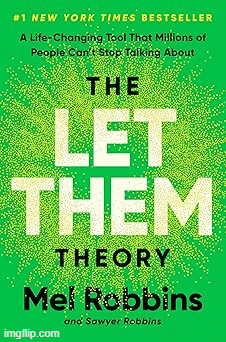10 Minute Summary of The Let Them Theory by Mel Robbins
- Quick Savant

- May 1, 2025
- 5 min read
Updated: May 1, 2025
Let Them Kindle https://amzn.to/4ie79YG
Let Them Hardcover https://amzn.to/4jsHMTZ
Let Them Audiobook https://amzn.to/4jyvkCj
The 5 Second Rule: Transform your Life, Work, and Confidence with Everyday Courage Audiobook https://amzn.to/3G6gmVH
The Let Them Theory: A Life-Changing Tool That Millions of People Can’t Stop Talking About by Mel Robbins, co-authored with Sawyer Robbins, is a self-help book published on December 24, 2024, that introduces a transformative mindset centered around two simple words: "Let Them." This concept, which Robbins credits to an epiphany sparked by her daughter Kendall during her son Oakley’s prom, encourages readers to relinquish the urge to control others’ actions, opinions, or behaviors and instead focus on what they can control—their own responses, goals, and happiness. Backed by Robbins’ no-nonsense style, personal anecdotes, psychological research, and insights from experts in neuroscience and relationships, the book serves as a practical guide to achieving emotional freedom, personal empowerment, and resilience. It has achieved significant acclaim, becoming a #1 New York Times, Sunday Times, Amazon, and Audible bestseller, with over 4 million copies sold and endorsements from figures like Oprah Winfrey, who called it one of the best self-help books she’s ever read.
Core Concept: The Let Them Theory
The Let Them Theory is built on a two-part framework:
Let Them: Allow others the freedom to be who they are, think what they think, and do what they do without attempting to control or change them. This includes letting go of trying to manage others’ opinions, judgments, or decisions—whether it’s a friend who doesn’t invite you to brunch, a partner who isn’t ready for commitment, or a colleague who underestimates you. Robbins argues that trying to control others is a waste of energy and a source of stress, as it’s ultimately futile.
Let Me: Shift your focus to what you can control—your own actions, responses, and priorities. This involves taking responsibility for your happiness, setting boundaries, and pursuing your goals without being derailed by external expectations or drama. Robbins emphasizes that this shift empowers individuals to live authentically and align their daily habits with long-term aspirations.
The theory draws from psychological principles like Stoicism, cognitive behavioral therapy (CBT), and neuroscience, which demonstrate that letting go of control reduces stress and enhances emotional well-being. Robbins presents it as a “mindset hack” that’s simple yet profound, applicable to relationships, work, personal growth, and emotional resilience. She illustrates its impact through relatable stories, such as her own struggle to micromanage her son’s prom plans, and broader examples, like dealing with a slow cashier or a friend’s unhealthy habits.
Structure and Key Themes
The book is structured as a step-by-step guide, organized around eight key areas of life where the Let Them Theory can be applied for maximum impact:
Relationships: Robbins encourages readers to stop trying to change family, friends, or partners and instead accept them as they are. For example, she advises letting a difficult parent “be themselves” while focusing on building the relationship you want based on your values. This fosters mutual respect and reduces resentment.
Work and Career: The theory helps readers release stress over uncontrollable workplace factors, like promotions or colleagues’ decisions, and channel energy into productive actions, such as skill-building or networking. Robbins shares the story of an employee who hit all targets but was denied a promotion, illustrating the futility of obsessing over others’ choices.
Emotional Regulation: Robbins explains that many adults react emotionally like children due to underdeveloped emotional regulation skills. By imagining others’ outbursts as those of an eight-year-old, readers can respond with compassion while maintaining boundaries.
Self-Doubt and Comparison: The book advises letting others have their advantages or successes without comparing yourself. Robbins argues that fixating on others’ achievements drains motivation, while focusing on your own path builds confidence.
Expectations and Judgments: Letting go of others’ opinions—whether it’s judgment from family or criticism from peers—frees you to pursue what matters. Robbins shares how she learned to let friends exclude her from plans and instead focus on those who value her.
Resilience Against Stress: The theory acts as a “sigh of relief” for the brain, reducing the physiological stress response that hijacks rational thinking. Robbins cites neuroscience to show how letting go lowers anxiety.
Personal Growth and Authenticity: By embracing vulnerability and authenticity, readers can break free from perfectionism and align their actions with their true desires, leading to greater self-confidence.
Pursuing Goals: Robbins encourages taking creative risks and defining success on your own terms, unburdened by societal pressures or others’ definitions of achievement.
Each chapter includes a recap of key takeaways, making the book accessible and actionable. Robbins blends personal stories—like her struggle to “fix” her parents or her emotional reaction to being left out of a friend’s trip—with research and expert insights from fields like psychology and ancient wisdom (e.g., Stoicism and Buddhism).
Key Examples and Anecdotes
Robbins’ storytelling is a cornerstone of the book’s appeal, grounding abstract concepts in relatable scenarios:
The Prom Epiphany: The book opens with Robbins micromanaging her son Oakley’s prom, fretting over details like corsages and dinner plans. Her daughter Kendall’s exasperated “Let them!” snapped her out of control mode, inspiring the theory. This moment of surrender—letting Oakley and his friends navigate prom their way—brought Robbins peace and became the book’s foundation.
The Slow Cashier: At a garden center, Robbins grew frustrated with a slow cashier but used “Let Them” to shift her perspective, calming her stress and focusing on her own response. This illustrates the theory’s application to everyday irritations.
Toxic Friendships: Robbins recounts being excluded from a friend’s trip and initially obsessing over why. Applying “Let Them” helped her realize others’ choices often reflect their priorities, not her worth, allowing her to invest in reciprocal relationships.
Family Dynamics: Robbins advises letting difficult family members, like a judgmental parent, be themselves while choosing how you engage. This approach fosters healthier boundaries without conflict.
Workplace Frustrations: The story of an employee denied a promotion despite strong performance highlights how letting go of others’ decisions frees energy for personal growth, like seeking new opportunities.
Strengths and Impact
The book’s strengths lie in its simplicity, relatability, and practicality. Robbins distills complex psychological and philosophical ideas into a two-word mantra that’s easy to grasp and apply. Her conversational tone, likened to a friend giving advice, makes the book accessible to a wide audience, particularly those struggling with anxiety, perfectionism, or people-pleasing tendencies. The inclusion of a 14-page bibliography, contributions from experts like Harvard’s Dr. Stuart Ablon (in a parenting guide), and a leadership guide co-authored with David Gerbitz add depth and credibility.
The Let Them Theory has resonated widely, with 15 million views of Robbins’ initial social media post introducing the concept and nearly 1.5 million likes on an Instagram video. Readers report feeling liberated, with some tattooing “Let Them” on their bodies as a reminder. The book’s impact is evident in its ability to help readers set boundaries, reduce stress, and prioritize personal growth, as seen in testimonials like influencer Holly Brooks, who credited it with a “pivotal moment” in her healing journey.
#LetThem #TheLetThemTheory #MelRobbins #SelfHelp #PersonalGrowth #Mindset #Motivation #Happiness #Boundaries #Confidence #Relationships #StressRelief #Empowerment #LifeChange #Success #Love #Control #Freedom #Goals #Resilience #Psychology #Neuroscience #Wisdom #Inspiration #Transformation #Bestseller #NewYorkTimes #Audiobook #Podcast #Strategies #Tools #Acceptance #Fulfillment #Joy #Career #Friendships #Habits #Courage #MentalHealth #SelfConfidence
Let Them Theory,Mel Robbins,self-help,personal growth,mindset,motivation,happiness,boundaries,confidence,relationships,stress relief,empowerment,life change,success,love,control,freedom,goals,resilience,psychology,neuroscience,wisdom,inspiration,transformation,bestseller,New York Times,audiobook,podcast,strategies,tools,acceptance,non-attachment,fulfillment,joy,career,friendships,habits,courage,focus,energy,mental health,self-confidence,personal power,life improvement











Comments